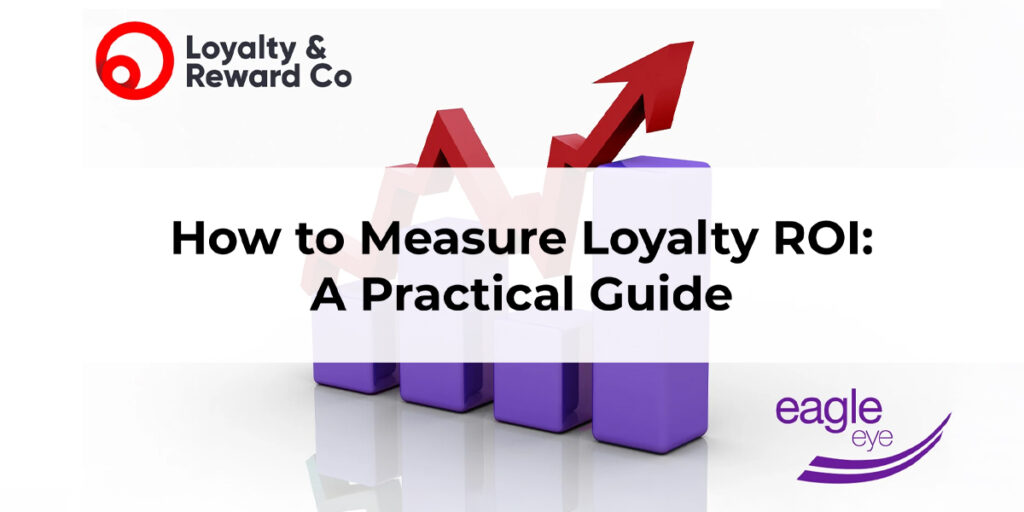
Co-written by Sarah Jarvis from Eagle Eye, and Hunter Murray and Anand Patel from Loyalty & Reward Co
Loyalty programs are a powerful tool for generating valuable insights which enable businesses to deepen customer engagement, unlock headroom and boost repeat business…but how do you measure their absolute impact? Measuring loyalty ROI goes beyond just tracking how loyalty members behave vs. non-members, it’s about understanding the holistic impact of the program across every facet of the business. As we shared in our last blog, the below shows how loyalty ROI can be calculated:

Here’s how to approach measuring loyalty ROI with clear steps and actionable insights to maximise your program’s potential.
Step 1 – Choose the Time Horizon
Pre-launch: A 3–5-year horizon is ideal – long enough to observe the commercial impact of the loyalty program, but not so long that assumptions become speculative or unrealistic.
Post-launch (1-3 years): Use the same ROI methodology as pre-launch with actual data to make comparisons, then make adjustments and enhancements to the ROI methodology to track year on year.
Established program (3+ years): Make adjustments and enhancements to the ROI methodology to track performance year on year.
Step 2 – Understand the Commercial Baseline
To measure the impact of a loyalty program, start by calculating business performance without it. This forms your baseline for comparison. Below are common inputs for establishing a commercial baseline:
| Input | Definition |
| Baseline Revenue | Total sales during a specified period |
| Total Unique Customers | Total number of individual customers who have made at least one purchase during a specified period |
| Average Revenue per Customer | Total revenue divided by the number of unique customers |
| Transactions | Total number of purchases made by customers within a specified period |
| Customer Churn | The percentage of customers who stop engaging with the business during a given period |
The business will change annually, so apply a growth rate to forecast future performance beyond the current year.
Note:
- Existing businesses without a loyalty program: Use actual customer data.
- Existing businesses with a loyalty program: Use non-member data and extrapolate or use non-member and member data and subtract the incremental revenue (step 5) from the baseline.
- New businesses: Use assumptions and forecasts.
Step 3 – Determine the Program Engagement
Who is engaging with your program? Base your engagement inputs on evidence from market research, loyalty industry benchmarks, or actual data.
| Input | Definition |
| Program Penetration | The percentage of customers enrolled as members in the loyalty program |
| Tag/Swipe Rate | The percentage of absolute member sales and transactions where program benefits are earned. E.g. members may not earn points on every transaction or may forget to tap their card |
Step 4 – Determine the Incremental Revenue
Incremental revenue represents the additional revenue generated by the loyalty program. Combine baseline and engagement inputs with the following metrics to calculate it:
| Input | Definition |
| Acquisition Growth Rate | The percentage increase in new customers due to the loyalty program |
| Increase in Individual Member Spend | The percentage increase in member spend due to the loyalty program |
| Increase in Total Member Spend | The percentage of members who increase their spend due to the loyalty program |
| Retention Rate | The percentage of members who would have ceased being a customer if it had not been for the loyalty program |
Step 5 – Determine the Program Costs
What are all the costs associated with the loyalty program? Categorise costs to ensure a comprehensive view as we have below:
| Input | Definition |
| Implementation Costs | The costs associated with designing, building and launching a loyalty program. This includes human resources, technology, and marketing |
| Operation Costs | The costs associated with running a loyalty program. This includes human resources, technology, marketing, and rewards |
Step 6 – Determine the Program ROI
With incremental revenue and program costs at hand, calculate ROI using the formula:
ROI:

Note:
- Gain from investment = incremental revenue (step 4)
- Cost of investment = program costs (step 5)
Step 7 – Continuously Refine the ROI Calculation
Measuring loyalty ROI is not a one-off task – it’s an evolving process that adapts to the changing dynamics of your program. Over time, certain inputs may gain prominence, and additional dimensions of program value, such as the impact of member data, brand advocacy, and customer lifetime value, can be incorporated.
Start small by focusing on actionable insights, then iterate and refine your approach as you gather more data. Regularly revisiting and adjusting your ROI model ensures it remains accurate and relevant, enabling you to better assess how effectively your program engages customers, drives loyalty, and generates sustainable value.
What’s Next?
Ready to dive deeper into loyalty ROI? Stay tuned for our next blog, where we’ll explore the common challenges businesses face when measuring loyalty ROI and how to overcome them to unlock even greater value from your loyalty program.
Loyalty & Reward Co have a proven method for helping businesses calculate loyalty ROI. Connect with us to discuss how our LROI™ approach can help you.
Eagle Eye powers loyalty programs for retailers across the world and has personalization solutions proven to deliver a 7:1 ROI. To find out more about Eagle Eye, visit www.eagleeye.com.

